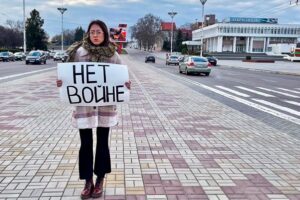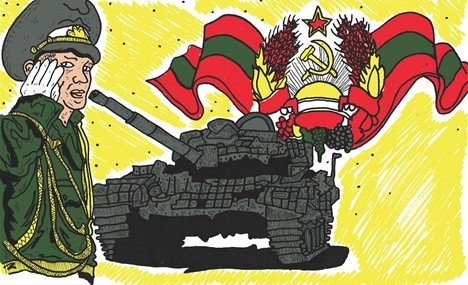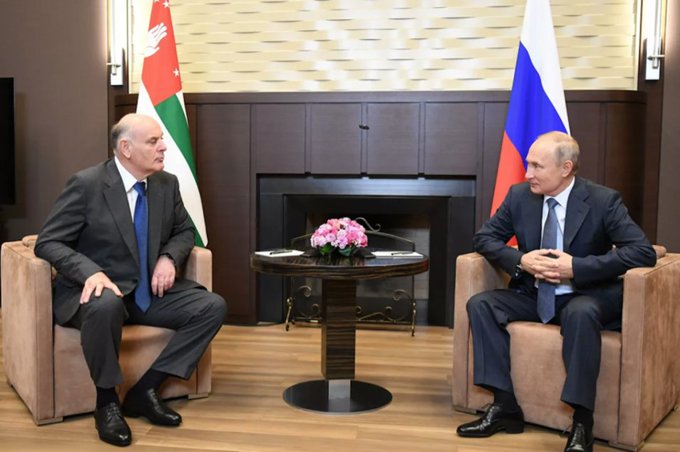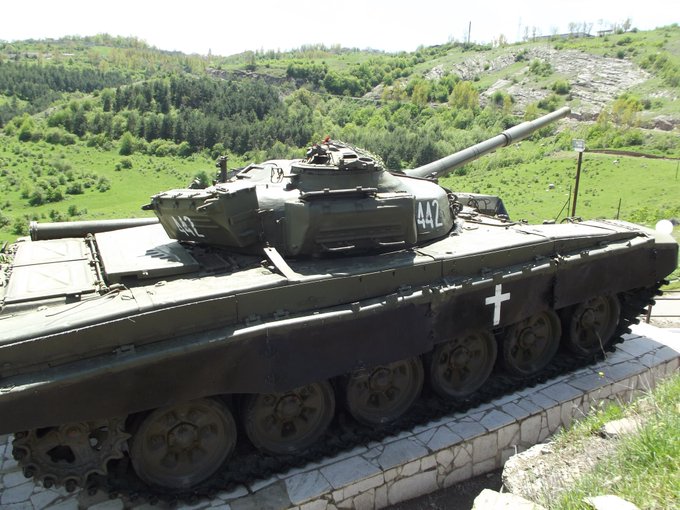Transnistria’s Ambiguous Response to Russia’s Invasion of Ukraine
Transnistria’s response to the war in Ukraine has likely surprised many commentators. When Russia’s invasion began, many speculated that Transnistria may be Putin’s next target. The publication of Belarussian President Alexander Lukashenka’s infamous map only fueled such speculation.
Still, the Ukrainian government is taking the prospect of an attack from Transnistria very seriously. As soon as the war began, Kyiv closed its border with the separatist state. On March 4, the Ukrainian armed forces destroyed a railway bridge connecting the pair. According to reports, the bridge was destroyed to prevent Russian troops stationed in Transnistria from crossing into Ukraine.
Over the past few weeks, the Ukrainian government has claimed on several occasions that Russian forces stationed in Transnistria may be used to attack Ukraine. Kyiv, as well as several other governments, have also accused the Russian government of attempting to recruit mercenaries in Transnistria. The de-facto government denied these allegations.
It is worth noting that the Moldovan government also denied Ukrainian allegations that more Russian troops have been deployed in Transnistria recently, while local authorities in the Ukrainian region bordering Transnistria are similarly also doubtful that such an attack will take place. The fact that commentators and the Ukrainian government anticipated some sort of provocation from Transnistria is not surprising.
The de-facto authorities in Transnistria are unapologetically pro-Russian. For the past 30 years, the de-facto regime in Tiraspol has been kept afloat with aid provided by Moscow and protected by the over 1,000 Russian troops stationed in the region. Moreover, the de-facto authorities regular assert that their final objective is to join Russia, a prospect supported by the majority of locals. This is what makes Transnistria’s response to Russia’s invasion of Ukraine so perplexing.
Unlike South Ossetia or Abkhazia, the de-facto authorities in Transnistria are yet to officially endorse Putin’s war. While the de-facto authorities in the South Caucasus are organizing mass rallies in Tskhinvali and Sukhumi in support of Russia’s “special military operation”, their counterparts in Tiraspol are refusing to even use the term, instead opting to call it the “situation in Ukraine”.
Unsurprisingly, Transnistria is yet to condemn Russia’s actions either. However, there have been some interesting statements published on the de-facto authorities’ official news website, Novosti Pridnestrovya. Take, for example, a statement made by de-facto President Vadim Krasnoselsky just days after the war broke out, when he referred to the events unfolding in Ukraine as “tragic”. In a recent interview, a refugee from the Odesa district described how she fled her home in terror as artillery shells fell around her.

Image: A woman standing with a “No War” sign in Tiraspol centre (Source: Alexander Udodov)
These statements are minor when compared with the regular condemnations issued by countries in the EU and NATO. Nevertheless, unlike South Ossetia and Abkhazia, references to “de-nazification” have been conspicuously absent from official statements issued by elites in Transnistria about the ongoing war.
The war in Ukraine places Transnistria in a difficult position. While the de-facto authorities may be pro-Russian, Transnistria has deep historical, cultural, and economic ties to Ukraine which they cannot ignore. Ukrainian is one of Transnistria’s three official languages. The de-facto state’s main university is named after famed Ukrainian poet, Taras Shevchenko, who is also featured on the fifty rouble note. Moreover, before the war, Transnistria exported more goods to Ukraine than it did Russia.
The people of Transnistria and Ukraine also share deep social ties. According to Transnistria’s de-facto Minister of Foreign Affairs, Vitaly Ignatyev, some 100,000 Transnistrian’s hold Ukrainian citizenship. These close social ties are also reflected in the official statistics. According to the de-facto authorities, over 30,000 people have transited through Transnistria since February 24, 20,000 of whom decided to stay.
Of those that remained, just over 400 opted to stay in government-provided accommodation. Most of those not in government accommodation are said to be staying with family and friends. It is worth noting that given the border between Ukraine and Transnistria is closed, these refugees must first enter Moldova and then make the journey to Transnistria.
Transnistria’s current stance on the war is perfectly in line with a policy of “neutrality” that Krasnoselsky has been pursuing since he assumed office in 2016. On multiple occasions, the de-facto president has refused to comment on who Crimea rightfully belonged to, refuted comparisons between Transnistria and the Donbas, and insisted that developing positive relations with Ukraine was one of his main objectives.
The de-facto authorities in Tiraspol have also used the ongoing war as a means to legitimize themselves and their “state”. For example, immediately following the outbreak of the war, Krasnoselsky took charge of a group established to coordinate the arrival of refugees. The de-facto President is also keen to be photographed touring accommodation centers.

Image: Vadim Krasnoselsky visiting accommodation centre in Dnestrovsk (Source: Novosti Pridnestrovya)
The influx of refugees has also brought the de-facto authorities into direct contact with several international organizations, such as the Red Cross and the United Nations. Novosti Pridnestrovya gleefully reports on how representatives from these organizations met with the de-facto President or the Minister of Foreign Affairs
The separatist regime is also eager to demonstrate to citizens, as well as the international community, that they have the capacity to take care of the incoming refugees. According to official reports, incoming refugees are provided with free medical assistance and access to psychologists should they require it.
Additionally, over 500 children are said to be studying in Transnistrian schools, with some even receiving education in Ukrainian. The news also regularly reports how employees of various state agencies, charitable organizations, and even regular citizens, have mobilized themselves to aid those arriving from Ukraine. In essence, the de-facto authorities are using the war to prove to the world that they can “rise to the occasion”.
However, it has not been all smooth sailing for the de-facto authorities. The war in Ukraine, and its consequences, has placed a considerable strain on relations between Moldova and Transnistria. Following Moldova’s application for EU membership, the de-facto Ministry of Foreign Affairs issued a statement requesting that the international community “face reality” and recognize Transnistria.
The Parliamentary Assembly of the Council of Europe’s (PACE) decision to recognize Transnistria as a region occupied by Russia was also met with a strong rebuke from the separatist authorities. The de-facto authorities have also accused Chisinau of using the ongoing “situation” in Ukraine to put pressure on Transnistria.
For example, the de-facto Ministry of Foreign Affairs claims that Moldova has imposed a blockade on Transnistria, preventing the separatist state from importing vital items such as medicines. They also claim Moldova is blocking Transnistrian exports, including products manufactured in the Moldavian Metallurgical Plant. The de-facto government claims these actions are not only hurting the Transnistrian economy, but they are also impacting refugees. Ignatyev even raised the issue at a recent meeting with representatives from the Red Cross.
The Transnistrians also accuse the Moldovans of purposely undermining the ongoing negotiation process. In particular, they allege that since Ukrainian delegates withdrew from the peacekeeping mission, the Moldovan side has grown increasingly uncooperative. Moldova’s recent decision to ban the Saint George’s Day Ribbon has also attracted criticism in Transnistria. Several commentators have argued that this is further “proof” that the people in Moldova and Transnistria are culturally different.
It is worth noting, however, Chisinau’s decision to ban these symbols was also unpopular with many pro-Russian figures, and in other parts of Moldova, including Gagauzia. Additionally, those articles that criticise Moldova’s decision neither explain why it was taken, nor mention that the “Z” symbol is also banned. Amidst the rising tensions with Moldova and the continuous influx of Ukrainian refugees, the de-facto authorities have had to contend with another problem: disinformation.
In the first few days of the conflict, Krasnoselsky felt compelled to dismiss rumors circulating on Telegram that able-bodied men were requested to go to central Tiraspol for military recruitment. In the days following the PACE’s decision, an email was sent to every school in Transnistria claiming that mines were placed around the building.
According to some accounts, the email stated that if Transnistria was not immediately returned to Moldova, the mines would be denotated. This, however, was not reported in Transnistria. In the days that followed, several other locations, including the Shevchenko Transnistria State University and the Moldavian Metallurgical Plant, also received bomb threats. The threats were eventually dismissed as hoaxes by “email terrorists”. However, the de-facto authorities clearly took them very seriously, and some institutions returned to remote learning for one week.
Since Russia’s invasion of Ukraine, the de-facto authorities in Transnistria have found themselves in a difficult position. Unable to throw their support behind their patron, the de-facto government in Transnistria has attempted to remain neutral. In their eyes, the sudden influx of refugees has given the de-facto authorities the opportunity to prove to the world that they are a functioning state.
Nevertheless, relations between Tiraspol and Chisinau are deteriorating under the pressure of the rapidly changing geo-political environment. Transnistria’s position on the war may change, especially if Putin signals his intention to annex “Novorossiya”. However, until then, it is likely that Tiraspol will continue its careful balancing act.
Author: Keith Harrington






